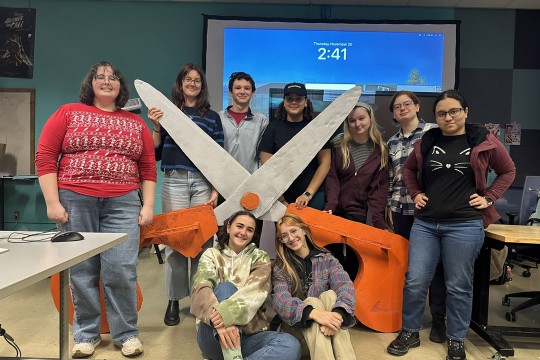Eisenhart award winner Ammina Kothari applies research methods to improve her teaching
College of Liberal Arts associate professor and program director honored with award for outstanding teaching
A. Sue Weisler
Associate Professor and Program Director in the School of Communication, Ammina Kothari, was recognized with the Eisenhart Award for Outstanding Teaching, RIT’s highest honor for tenured faculty.
Ammina Kothari, an associate professor and program director in RIT’s School of Communication in the College of Liberal Arts, realized right away that her numbers-heavy data journalism class was intimidating some of her students.
She tried a number of tactics to remedy this, but only through surveying her students did she find her answer. Kothari does this often. Instead of waiting for student evaluations at the end of the semester, she conducts informal surveys to gather feedback throughout.
This time, the feedback was telling her that her students were struggling with Excel. There was a discrepancy; some of her students were proficient in the program while others were unfamiliar.
2020-2021 Celebration of Teaching and Scholarship Honorees
Amanda Bao: Building bridges as an engineer and a teacher
Eisenhart Award winner Nathaniel Barlow strives to bring out the fun in math
Emmett Ientilucci’s knack for engaging students earns him award for excellence in teaching
“I redid the whole course structure,” she said. “I decided to use LinkedIn Learning, which provides captioned tutorials that are really easy to follow. So rather than me coming into the classroom and walking the students through each step, they do the tutorial at home at their own pace. This allows us to come together as a class and work on real data rather than wrestling with Excel.”
Kothari is receiving an Eisenhart Award for Outstanding Teaching this year, RIT’s highest honor for tenured faculty.
Kothari started teaching as a graduate student at University of Oregon, where she taught Swahili. While pursuing her Ph.D. at Indiana University, she began developing and teaching journalism and media courses on her own. It was there that one of her professors first suggested she incorporate an informal student survey approach in the classroom to gather feedback about her teaching.
Kothari brought that habit with her when she started at RIT nine years ago. Since then, she has developed 12 new courses and, as program director, updated the communication MS graduate program curriculum.
To ensure the classes are universally accessible, Kothari regularly collects student feedback via surveys, evaluates the data she’s collected, interprets the results, and implements changes to better her students’ experiences in her classroom. She understands, she said, that everybody learns differently and teaching isn’t a one-size-fits-all skill.
“I approach teaching-related problems from a research perspective and try to solve them using research methodologies. I think if you collect data from your students it can inform the changes you are making in the classroom. Rather than just throwing something out to see if it works, why not gather real data to find out what the students need to succeed in the course?”
When she first began teaching at RIT, she had deaf and hard-of-hearing students in her classroom for the first time. She also realized her students may have non-visible disabilities they’re not comfortable discussing. The informal surveys help her understand how to cater her curriculum to all students while maintaining confidentiality to ensure her students are comfortable sharing their learning needs.
This academic year was no different as Kothari learned how to teach a classroom of students who were both in-person and tuning in remotely. She used this method to understand how best to reach both sets of students.
“Winning this award, especially during a pandemic, it’s a testament to my students. I say that because fall semester was particularly challenging,” she said. “I was teaching in-person with some students remote. They worked with me to make sure the classroom environment was what it was supposed to be. They made my work easy.”
2020 Eisenhart Award Recipients
The 2019-2020 Eisenhart Award recipients are also being recognized at the April 14 event.
Jeanne Christman excites student learning with engaging teaching style
James Perkins wins Eisenhart Award for Outstanding Teaching
Professor Michael Richmond’s passion for teaching physics and astronomy earns him Eisenhart Award
Josh Thorson culminates rewarding, challenging year with Eisenhart Award











